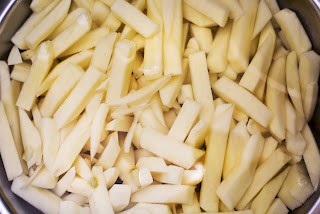When Botswana's Protectionist Policies Backfire: A Story of MaFresh
About a fortnight ago, I went over to my favorite local tuckshop, or semausu as they are commonly referred to this side of the country, to get a dose of my favorite guilty pleasure—fresh chips, or mafresh, prepared and served in very questionable hygiene conditions. To my surprise and heartbreak, the packet of mafresh i bought for a whooping P12.00 was not filled to the brim as I expected. As a matter of fact, it barely made its way to the halfway point of the packet's capacity.
Being the mafresh fiend that I am, I asked the gentleman who was serving me what the reason for such an abhorrent injustice was. His response was that since the beginning of the year, he has been having trouble procuring potatoes to make this beloved delicacy. The reason? The vegetable products import ban announced by government in December 2021 and imposed from 1 January 2022.
At the time of announcing the ban, government's justification was that the ban, in line with the recently passed Economic Inclusion Act, was meant to ensure that retailers bought vegetables from local farmers instead of importing from neighboring countries especially South Africa. In support of the ban, government also introduced subsidies for vegetable farmers which were meant to fund programs expected to cushion farmers from harsh climatic conditions, increase production from farms and ensure good agricultural practices in vegetable farming in the country, the end result being local farmers being able to meet demand.
Taking all this into consideration, it would seem like government's import ban had been well-thought-out and was foolproof. Put a restriction on imports, support local farmers with subsidies to enable them to meet demand, and then boom, you have solved the problem of a ballooning vegetable products import bill. It seemed ingenious, at least in theory.
The good intentions fallacy is a term coined by the economist Milton Friedman and is described as the belief that one is right just because their intentions are "pure". Government's import ban was meant to support local farmers and boost local agricultural activity but what it has done is lead to a shortage of the banned products with no solution in sight. A classic and constantly recurring case of "good intentions, bad outcomes" by government.
Before deciding on imposing the bill, had the government even bothered to at least conduct a study to gauge the capability of local farmers to plug up the void that would be left by importers? Did they bother to conduct studies to at least have an idea of how effective the horticulture subsidy program would be in helping local farmers meet demand? I very much doubt they did any of those because if they did, I would not be paying P12.00 for a half-packet of mafresh.
There is no denying that protectionist policies, when implemented right, can go a long way in boosting budding local industries. But the problem is that "right implementation" is not something the government of Botswana is very good at. What they are good at is coming up with policies that do nothing but aim to increase their popular support instead of genuinely and legitimately serving the people.
Why didn't they, instead of an outright ban on the vegetable products imports, rather introduce a quota system to allow them time to study and monitor the ability of local suppliers to meet demand while also ensuring that there is no shortage? Wouldnt that have worked much better than the disaster they have created through the ban? Of course, it would have, but it would not have invoked as much popular support as an outright ban.
This, of course, is not the first time that protectionist policies have failed in Botswana and proven to be just tools of garnering populist support but, despite all the harsh lessons served by the ban on poultry imports, which ended up creating a poultry industry monopoly, and the ban on maize snacks just last year and now this vegetable ban, not even a drop of wisdom has been learned from these experiences. As Rita Mae Brown put it in her novel "Sudden Death", "Insanity is doing the same thing over and over again, but expecting different results."
In announcing the ban, government had said that it will be reviewed every two years to address its shortcomings. It has been only a mouth and the shortcomings of it are already being felt. The thought of waiting another 23 months before I can get a full packet of mafresh haunts my daily existence but at least, looking at the brighter and healthier side, ill get to eat my veggies instead. Oh, wait...



i agree with you on the fact that there needs to be proper research done before we go on and implement policies
ReplyDeletei think it was/is a good policy - i feel like maybe reducing imports and supporting local producers is a way get ramp up our production and create jobs etc
i dont really trust my sources - but isnt there a shortage of potatoes anyway ? or is that for yonder regions that have nothing to do with us ?
This comment has been removed by a blog administrator.
ReplyDeleteThis comment has been removed by a blog administrator.
ReplyDelete